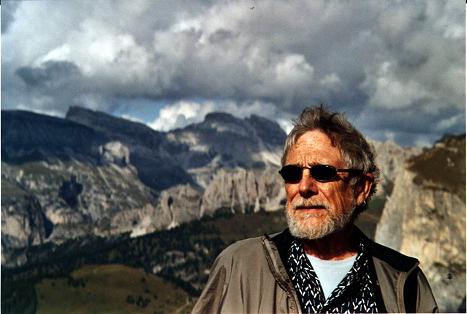Hello Earth. What can we say to you on a day like today—your day—when the glaciers are melting and the rivers are rising? That we’re sorry? We know that you’re sick. We know that we’ve taken advantage of you, that we’re responsible for your dangerously high temperatures. Should we apologize to you on your big day? At a moment like this, would it be awkward if we said “Thank you”?
On this Earth Day I’m thinking of something that Kurt Vonnegut wrote towards the end of his life.
The crucified planet Earth, should it find a voice and a sense of irony, might now well say of our abuse of it, “Forgive them, Father. They know not what they do.”
The irony would be that we know what we are doing.
When the last living thing has died on account of us, how poetic it would be if Earth could say, in a voice floating up perhaps from the floor of the Grand Canyon, “It is done. People did not like it here.”
Oh, Kurt! Oh, humanity! Seriously, this makes me want to cry. But, it should be pointed out, some people do like it here. I think of Katy Butler and her award winning 2005 Tricycle article, “Everything is Holy.”
An hour later I round a ridge and the peak of the mountain reveals herself, rising. I remember Mirabai, the sixteenth-century devotional poet who abandoned her aristocratic family and wandered India, singing, “I worship the mountain energy night and day.” The trail switchbacks take me down deeper. An hour after noon, I stop at a flat, thick wooden bench in a grove of old-growth redwoods that the loggers left behind. Here I sit zazen, robed in silence and filtered brown light. The natural world restores my soul. It soothes me like a mother. I rest my head on it and lay my burdens down before it the way some Christians rest their heads on the cross.

I’m thinking also of the countless Buddha-ancestors who have both deeply loved our Mother Earth and/or worked tirelessly on her behalf: Emerson, Thoreau, Thich Nhat Hanh, Joanna Macy, Gary Snyder. On the Huffington Post today we have David Loy and John Stanley telling us about their EcoBuddhism project and where Buddhism and environmentalism intersect.
The Buddha developed a culture of awakening from self-centered conditioning. But we are living in the midst of social-engineering technologies that persuade us to base our identity on consumption. My consumer-self is dogged by dissatisfaction, so I spend more and more to resolve the conditioned anxiety. And I will resist the truth of ecological crisis because consumption has compelling psychological meaning for me.
If Buddhist meditation is to have comprehensive relevance now, it must be able to cut through such social conditioning. And that must take place in a context that is vastly different from the Indian Bronze Age, when the Buddha first set forth his noble path to awakening.
We should also consider Clark Strand’s “Green spirituality,” and his exploration of what it might mean to become a “Green Bodhisattva.”
What I’m getting at here is that, despite Vonnegut’s haunting image, we have reason to be optimistic. Hey Earth, if you’re listening, people do like it here. We at Tricycle like it here, and we’d like to take a moment on this Earth Day to say “sorry” and to say “thank you.”
Thank you for subscribing to Tricycle! As a nonprofit, we depend on readers like you to keep Buddhist teachings and practices widely available.